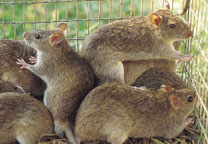|
Integrity Maps
Where are your actions?
|
The following charts illustrate various combinations of
behavior, including compliance with authority, contribution to the goals of the
organization, appearance to others, underlying intent, and ability to complete
an assigned task. Each map divides the landscape into quadrants with descriptive
labels attached to each region. These labels are used to name the behavior of
the person who has chosen to occupy that region.

Entrepreneurs want to make a positive contribution to the
goals of the organization. They would rather add value than waste time, money,
or other resources. Bureaucrats often insist on strict obedience of their
demands and commands. This does not cause a problem as long as the bureaucrats
demands result in added value to the organization. This is the integrity region
of the map. The problem comes in all too often when the bureaucrat demands
obedience to a request that is wasteful, oppressive, self serving, or abusive.
This causes a dilemma for the entrepreneur, should he continue to add value, or
obey the wasteful demand of the bureaucrat? The choice to disobey and add value
is a courageous choice, and is labeled maverick on the map. Unfortunately it can
lead to being labeled as uncooperative, disloyal, rebellious, and
unprofessional. It won’t be long before you are identified as a troublemaker and
scapegoat. Bureaucrats are often very skillful at intimidating, punishing and,
disciplining those guilty of insubordination. The other choice is to obey the
bureaucrat and incur the waste. This is easiest in the short term, and the most
common choice. It is labeled sheep in the map to describe mindlessly following
the person in the position of leadership. The problem with this choice is that
this leads quickly to self doubt, lack of confidence, loss of commitment to the
goals of the organization and eventually to a mediocre career, loss of self
esteem, and it turns potentially rewarding work into drudgery.

Bureaucrats always want to “look good” regardless of their
true intent. Use this appearance / intent integrity map to track their
movements. When their intent is selfish and in conflict with the goals of the
organization they are operating as snakes. Often the bureaucrats
describe themselves as operating in the integrity region when
actually they are snakes. Don’t confuse this with an entrepreneur
who is well intended, but needs to use “tough love” or strict or stern behavior
to get the required results. We all remember a strict teacher, coach, parent,
friend, boss, or mentor who appeared tough while acting in the very best
interests of the organization and ourselves. This stern approach to changing
behavior for the better is labeled tough guy on the map.

Can you help us out? The entrepreneur always wants to
answer with an enthusiastic “yes”! Unfortunately we often get asked or coerced
to commit to completing a task that exceeds our ability. This may be because
the task is not well understood, or we are not given the resources, authority,
or time to complete the task, or the task may simply be impossible for anyone to
accomplish. A detailed
dialogue regarding what is being asked for, what
resources and time will be available, how problems will be handled, how changes
in the plans will be handled, who is responsible for each task and work item, and how help can
be obtained is essential to avoiding misunderstandings and naïve, insincere, or
unreliable commitments. Trust demands both intent and
ability. Often the entrepreneur’s inability to complete an
assigned task is addressed by the bureaucrat as a lack of intent, poor
motivation, not caring or lack of loyalty. The bureaucrat may complain about the
inability to motivate people around here. Why is there no sense of urgency? When
is he finally going to listen to what I am asking for and get up and go to work
on this? The bureaucrat will then ask for additional sacrifice from the
entrepreneur, as a demonstration of sincere intent. Unfortunately the result is
mistaking sacrifice for commitment. As an entrepreneur, use this map to describe
the region where you believe you can work to carry out the requested task. Don’t
let a commitment of yes - best effort be misunderstood for an
unconditional commitment. A well-intended Yankee spirit
commitment can later become as damaging as planned sabotage.
Affirm your good intent and address specific difficulties. Ask the bureaucrat
for help in overcoming these difficulties. regarding what is being asked for, what
resources and time will be available, how problems will be handled, how changes
in the plans will be handled, who is responsible for each task and work item, and how help can
be obtained is essential to avoiding misunderstandings and naïve, insincere, or
unreliable commitments. Trust demands both intent and
ability. Often the entrepreneur’s inability to complete an
assigned task is addressed by the bureaucrat as a lack of intent, poor
motivation, not caring or lack of loyalty. The bureaucrat may complain about the
inability to motivate people around here. Why is there no sense of urgency? When
is he finally going to listen to what I am asking for and get up and go to work
on this? The bureaucrat will then ask for additional sacrifice from the
entrepreneur, as a demonstration of sincere intent. Unfortunately the result is
mistaking sacrifice for commitment. As an entrepreneur, use this map to describe
the region where you believe you can work to carry out the requested task. Don’t
let a commitment of yes - best effort be misunderstood for an
unconditional commitment. A well-intended Yankee spirit
commitment can later become as damaging as planned sabotage.
Affirm your good intent and address specific difficulties. Ask the bureaucrat
for help in overcoming these difficulties.
References
The Empowered Manager: Positive Political Skills at Work ,
by Peter Block ,
by Peter Block
|
Fear, Sadness, Anger, Joy, Surprise, Disgust, Contempt,
Anger, Envy, Jealousy, Fright, Anxiety, Guilt, Shame, Relief, Hope, Sadness, Depression, Happiness,
Pride, Love, Gratitude, Compassion, Aesthetic Experience,
Joy, Distress, Happy-for, Sorry-for, Resentment, Gloating, Pride, Shame, Admiration, Reproach,
Love, Hate, Hope, Fear, Satisfaction, Relief, Fears-confirmed, Disappointment, Gratification,
Gratitude, Anger, Remorse,
power, dominance, stature, relationships |





